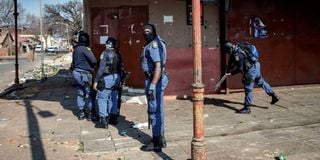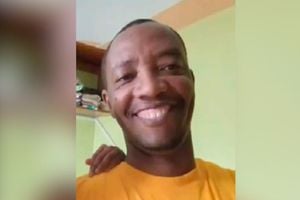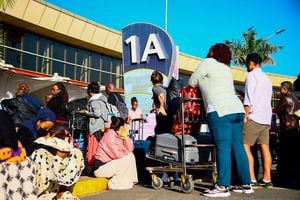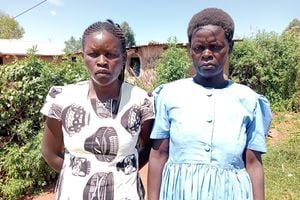South Africa on the edge over political ‘assassinations’

South African police officers take position as they try to disperse protesters (not seen) in Jeppestown, Johannesburg, on July 11, 2021.
What you need to know:
- Former Police Minister Bheki Cele mentioned in September that 348 suspects had been charged in 233 cases of political violence, but it remains unclear how many arrests have been made.
- “It’s the paid assassins who are arrested, not those who plan, those who pay,” said Thami Ntuli, chairman of the South African Local Government Association.
South African politicians have become targets of assassination in recent months, throwing the country’s leadership on the edge.
The latest victim, Moshe Mphahlele, was the Johannesburg regional leader of the Economic Freedom Fighters (EFF), the opposition movement led by firebrand Julius Malema. He was shot dead in Gauteng, the metropolitan region that covers Johannesburg, during a protest on August 3.
The assassination of Mr Mphahlele adds to the list of political figures who have been brutally silenced.
The motive or even the killers remain unknown but EFF leader Julius Malema alleged that those responsible for the death of the party’s regional deputy secretary returned to the scene to "contaminate" it.
Leading up to the May 2024 elections, South Africa saw a significant increase in assassinations, with a total of 40 recorded since the previous year. These attacks predominantly targeted local officials, politicians, and activists.
Moreover, there were 35 assassinations in the first four months of 2024, including 10 targeting politicians, averaging approximately one hit every two weeks.
This is according to information provided by Rumbidzai Matamba, an analyst at the Global Initiative Against Transnational Organised Crime, who has been conducting research on assassinations in South Africa.
Ms Matamba's 2024 report, co-authored with researcher Chwayita Thobela, highlights a total of 488 politically motivated assassinations that occurred between 2000 and 2023. The report defines “political assassinations” as the deliberate killing of politicians, councillors, public servants, administrators, political activists, whistleblowers, and other members of civil society for ideological or strategic reasons.
Furthermore, in 2023, a total of 131 assassinations were linked to organised crime, the minibus taxi industry, political motives, and personal reasons, including romantic and family-related killings for access to insurance payouts.
In the turbulent months leading up to the 2024 election, a string of tragic events shook the nation as 12 political leaders fell victim to violence. Among them were five council members of the African National Congress (ANC). Sbonelo Ntshangase, an ANC councillor, was tragically shot in Mkhondo, Mpumalanga, after raising concerns about safety threats on social media.
Similarly, Nomxolisi Nqwena-Maliwa, an ANC ward councillor, was found dead with a single gunshot wound in her car in Mbhashe municipality, Eastern Cape.
Mzwandile Shandu, an ANC councillor in uMkhambathini municipality, KZN, survived an earlier assassination attempt but was fatally shot in Umlazi. Sibusiso Gqeba, an ANC councillor in Vredenburg, Western Cape, met a similar tragic fate after enduring two previous assassination attempts.
The community was rocked once again when Simphiwe Sindelo, an ANC ward councillor, and ward committee member Fezile Nogwanya were shot multiple times while visiting a friend in Ext 25, Mpumalanga. Both of them later succumbed to their injuries in the hospital.
Ms Matamba believes ANC members have been the primary targets of political assassinations. “The significance of the ANC’s factional politics is that the overwhelming majority of the cases in the GI-TOC database were killings of ANC members, mostly commissioned by other ANC members, making it largely an intra-party problem, while an average of just two cases per year involved other political parties,” she said.
Several other political leaders in different regions of South Africa were killed recently, including Nhlalayenza Ndlovu, a DA councillor and chief whip of the uMngeni municipal council, who was killed in his home by gunmen.
John Myaka, a pastor and African Christian Democratic Party councillor in uMhlatuze, was killed in eNseleni in KwaZulu-Natal province while giving a sermon. Jonas Mpe, an EFF councillor in the Ephraim Mogale municipality in Gauteng, was shot dead at home. In July, Ntombenhle Mchunu, an NFP ward councillor in Kwa-Nongoma, was shot several times in her home.
Innocent Mkhwanazi, an IFP councillor in uMkhanyakude municipality in KZN, was killed by hitmen who fired bullets at his car. In August, Mabhungu Mkhize, an ANC councillor in Msunduzi municipality in KZN, was leaving a council meeting when he was attacked and killed by gunmen.
Ndukenhle Duma, an IFP councillor in Kwa-Nongoma who had recently been elected in a by-election, was shot dead on the side of the road while attending to his broken-down car.
South Africa has experienced a concerning increase in politically motivated violence, with the number of politically-linked assassinations steadily rising since 2010. According to the Global Initiative against Transnational Organised Crime, 31 political assassinations were recorded in 2023.
The distribution of these incidents by province mirrors previous years, with the highest number of political assassinations in 2023 (19) taking place in KwaZulu-Natal.
This province has been particularly affected by violence targeting local councillors. Conversely, significantly fewer cases were reported in Gauteng, the Eastern Cape, Limpopo, Mpumalanga, and the Western Cape.
The report also highlighted that the most political assassinations occurred during the 2019 national elections, with 42 incidents recorded. It was noted that violence tended to increase following national elections in 2004, 2009, 2014, and 2019, leading to a surge in killings.
In efforts to address this issue, the SA police created a specialised unit in 2018 to investigate political killings, with a focus on KwaZulu-Natal province. Despite this, updates on their progress have been scarce.
Former Police Minister Bheki Cele mentioned in September that 348 suspects had been charged in 233 cases of political violence, but it remains unclear how many arrests have been made.
“It’s the paid assassins who are arrested, not those who plan, those who pay,” said Thami Ntuli, chairman of the South African Local Government Association.





